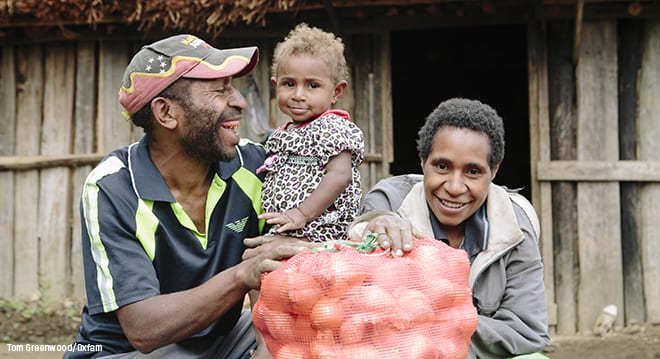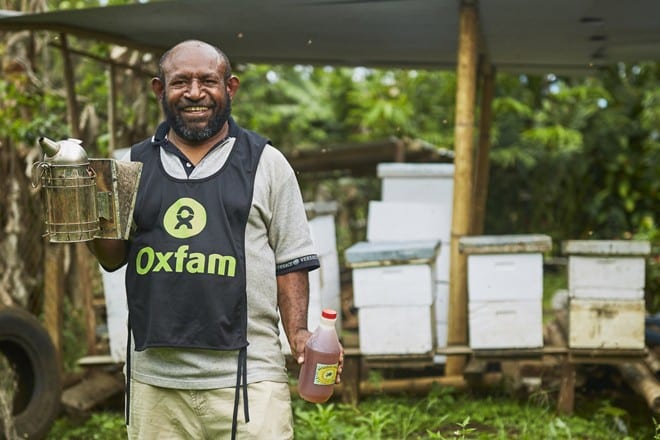Papua New Guinea faces a deadly pandemic of misinformation
In response to the New Zealand government sending a medical and logistics support team to Papua New Guinea (PNG) over the weekend, Oxfam Aotearoa says that while essential supplies and support is a good contribution, the government can, and must, do more.
Oxfam Aotearoa Communications and Advocacy Director Dr Jo Spratt said:
“Recently, we heard Hon. Minister Mahuta outline how Aotearoa would partner with Pacific countries to achieve resilience. Referring to our Pacific neighbours as family, the Minister recognised our deep and enduring whakapapa connections – Tātai Hono, and reiterated the importance of Tātou Tātou – all of us together. If there is any time to put these values into action, it is when one of our family members is experiencing a severe humanitarian crisis. This support from the government is a good start, but more needs to be done and urgently.”
Oxfam Papua New Guinea Country Director Eunice Wotene says that as the third coronavirus wave escalates out of control in the country, people are experiencing a lot of challenges. There are multiple issues over Covid-19 vaccinations, lockdowns, and an overwhelmed health system further perpetuating an already stressful situation.
In an effort to control the outbreak, the PNG government has put in place control measures banning gatherings of more than 20 people and encouraging the general public to follow the “Niupela Pasin” (new normal). Provincial Controllers like that of the Eastern Highland Province have implemented travel restrictions across the borders between districts. Wotene says that control measures implemented at the provincial level have helped reduce the spread of infection and has resulted in a reduction in the number of cases presenting at the hospital. However, this has also caused challenges and restricted people from getting to vaccination centres. It has also created economic challenges for people because they can’t get to markets, sell their produce, and earn an income to sustain themselves. This has, in turn, led to an increase in other social issues like petty crimes.
Thousands of doses of the AstraZeneca and Johnson & Johnson vaccines have been coming into PNG from neighbouring countries, but despite the large number of vaccines, PNG is struggling to get its vaccination rates above 9 per cent. Wotene says that while vaccines are welcome and needed, people are either misinformed about the risks, or unable to get vaccines:
“The situation is complicated. Many of our people live in remote rural villages. Information and vaccines aren’t reaching them, and travel restrictions between district borders make things difficult. For some people, even if they could make it to a clinic, they aren’t going because of the misinformation out there about the vaccines’ side-effects. There is a real sense of urgency now that we must do all we can to reach these people.
“In some villages, two or more family members have died from Covid-19, just days or weeks apart. We have a health system overcome with sick people and our people are dying.”
Local and international media recently reported that due to Port Moresby morgues being overwhelmed with the dead, PNG authorities had no choice but to approve mass burial.
New World Bank research, titled Addressing Vaccine Hesitancy: Survey and Experimental Evidence from Papua New Guinea, examined the motivation behind vaccine hesitancy in Papua New Guinea and tested various means of increasing people’s willingness to receive a Covid-19 vaccine. The report found that one of the main hurdles for Papua New Guineans was the fear of the vaccine itself. However, people’s replies also indicated they were open to learning more, particularly if information came from health workers. The research showed that when people were given basic information on the safety of the vaccine and the dangers of Covid-19 that increased the percentage of people who said they were willing to be vaccinated.
Wotene said: “We need health workers to go to the people to provide useful and factual information and help ease their fears. There is also need for mobile clinics where people from the rural communities can be reached for vaccination.”
Dr Spratt said: “In addition to the recent support and supplies, the NZ government should send new emergency funding to support the PNG government and other development partners to rapidly roll-out vaccine information campaigns across the country. This could be done through village health workers, local radio stations and other locally-appropriate communication methods.
“New Zealand still has millions of spare AstraZeneca and Janssen vaccines that we are not using here. We can and should donate these to PNG.”
Ends
Notes:
See the full report Addressing Vaccine Hesitancy: Survey and Experimental Evidence from Papua New Guinea







